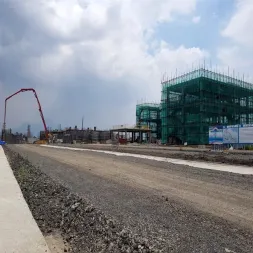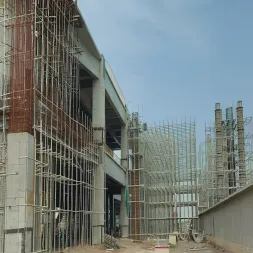
The Significance of a Founding Ceremony in Construction Projects
A founding ceremony marks a pivotal moment in any construction project, symbolizing the official beginning of the building process. These ceremonies often hold deep cultural, social, and economic significance, serving as a way to unite stakeholders, celebrate milestones, and foster community involvement. This article explores the various aspects of founding ceremonies, their importance, and how they are typically conducted.
What is a Founding Ceremony?
A founding ceremony, sometimes referred to as a groundbreaking ceremony, is an event held to celebrate the start of construction on a new building or infrastructure project. It often includes the participation of key stakeholders, such as project developers, government officials, community leaders, and sometimes even future occupants of the building.
Importance of Founding Ceremonies
Symbolic Significance: The ceremony represents a commitment to the project and a vision for the future. It symbolizes hope, progress, and the transformation of an idea into reality.
Community Engagement: Founding ceremonies provide an opportunity for community members to engage with the project, learn about its benefits, and express their support. This helps build a sense of ownership and pride in the development.
Stakeholder Collaboration: These events bring together various stakeholders, fostering relationships and collaboration that are crucial for the project’s success. Networking opportunities during the ceremony can lead to partnerships and shared resources.
Public Relations: A well-executed founding ceremony serves as a positive public relations opportunity for the developers and other stakeholders, showcasing their commitment to the community and enhancing their reputations.
Cultural Significance: In many cultures, founding ceremonies are steeped in tradition and rituals. These practices can enhance community ties and reflect local values and beliefs.
Components of a Founding Ceremony
A typical founding ceremony involves several key elements:
Speeches: Key stakeholders, such as the project manager, local government representatives, and community leaders, often give speeches outlining the project's significance, expected benefits, and future vision.
Symbolic Activities: Common rituals include the ceremonial turning of the soil with shovels, often presented as a photo opportunity. Some projects might include planting a tree or placing a time capsule to symbolize growth and continuity.
Cultural Elements: In some regions, ceremonies may include traditional music, dance, or other cultural displays to celebrate the occasion and engage the community.
Media Coverage: Founding ceremonies are often covered by local media, helping to publicize the project and inform the public about its benefits and progress.
Refreshments and Networking: Many ceremonies include refreshments, allowing attendees to mingle and discuss the project in a more informal setting.
Planning a Founding Ceremony
Successful founding ceremonies require careful planning and coordination:
Timing and Location: Choosing the right time and location is crucial to maximize attendance and impact. Considerations include accessibility, weather, and the significance of the site.
Invitations: A well-curated guest list should include key stakeholders, community leaders, and local media to ensure broad representation.
Logistics: Arranging for equipment, seating, and any required permits is essential to ensure a smooth event.
Promotion: Effective marketing and communication strategies can help attract attendees and generate public interest.
What is a Founding Ceremony?
A founding ceremony, sometimes referred to as a groundbreaking ceremony, is an event held to celebrate the start of construction on a new building or infrastructure project. It often includes the participation of key stakeholders, such as project developers, government officials, community leaders, and sometimes even future occupants of the building.
Importance of Founding Ceremonies
Symbolic Significance: The ceremony represents a commitment to the project and a vision for the future. It symbolizes hope, progress, and the transformation of an idea into reality.
Community Engagement: Founding ceremonies provide an opportunity for community members to engage with the project, learn about its benefits, and express their support. This helps build a sense of ownership and pride in the development.
Stakeholder Collaboration: These events bring together various stakeholders, fostering relationships and collaboration that are crucial for the project’s success. Networking opportunities during the ceremony can lead to partnerships and shared resources.
Public Relations: A well-executed founding ceremony serves as a positive public relations opportunity for the developers and other stakeholders, showcasing their commitment to the community and enhancing their reputations.
Cultural Significance: In many cultures, founding ceremonies are steeped in tradition and rituals. These practices can enhance community ties and reflect local values and beliefs.
Components of a Founding Ceremony
A typical founding ceremony involves several key elements:
Speeches: Key stakeholders, such as the project manager, local government representatives, and community leaders, often give speeches outlining the project's significance, expected benefits, and future vision.
Symbolic Activities: Common rituals include the ceremonial turning of the soil with shovels, often presented as a photo opportunity. Some projects might include planting a tree or placing a time capsule to symbolize growth and continuity.
Cultural Elements: In some regions, ceremonies may include traditional music, dance, or other cultural displays to celebrate the occasion and engage the community.
Media Coverage: Founding ceremonies are often covered by local media, helping to publicize the project and inform the public about its benefits and progress.
Refreshments and Networking: Many ceremonies include refreshments, allowing attendees to mingle and discuss the project in a more informal setting.
Planning a Founding Ceremony
Successful founding ceremonies require careful planning and coordination:
Timing and Location: Choosing the right time and location is crucial to maximize attendance and impact. Considerations include accessibility, weather, and the significance of the site.
Invitations: A well-curated guest list should include key stakeholders, community leaders, and local media to ensure broad representation.
Logistics: Arranging for equipment, seating, and any required permits is essential to ensure a smooth event.
Promotion: Effective marketing and communication strategies can help attract attendees and generate public interest.






